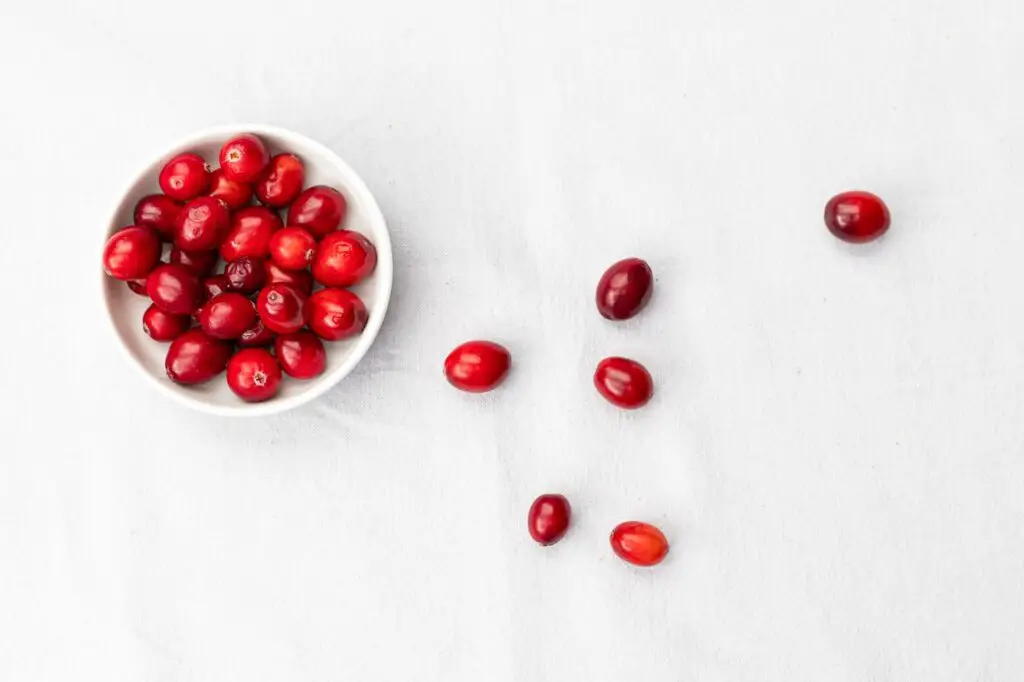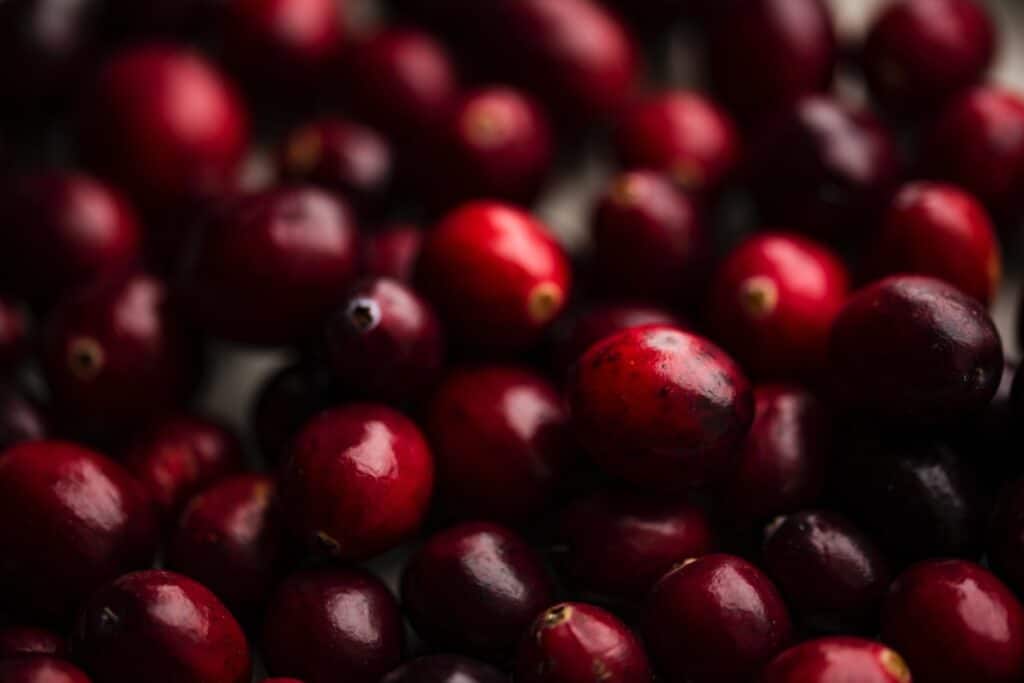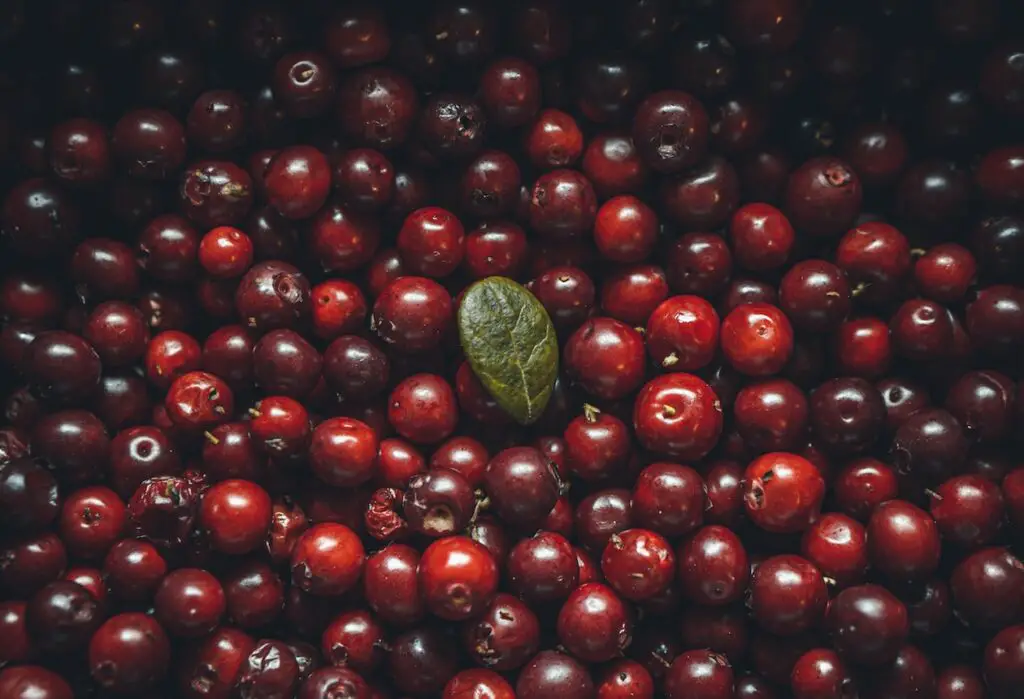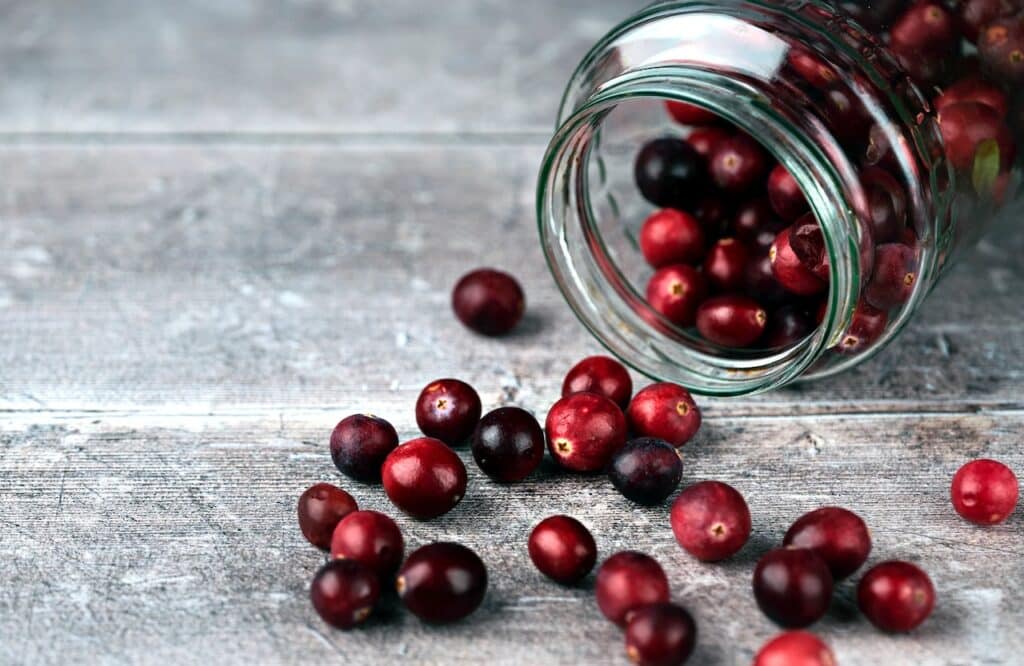Want to share your fruity snack with your dog? Wondering if cranberries are good for them? In ‘Can Dogs Eat Cranberries?’ we’ll answer that and more!
Yes, dogs can eat cranberries – they have vitamins and cool things that might help keep them healthy. But not all cranberry stuff is okay for dogs, and too much can cause problems. Let’s find out when cranberries are good for your pet and when they’re not so great
Read Also: Are Cherries Safe for Dogs?
Table of Contents

Some fun facts about cranberries
For a long, long time – like 12,000 years – people have been eating cranberries. They’ve been around since 1816 in gardens, but way before that, they were growing wild in swampy places.
The Wampanoag, who lived in a spot now called Southeastern Massachusetts, used fresh and dried cranberries to keep food good and to feel better. Even the early folks in North America used cranberries to avoid getting scurvy.
Now, cranberries are part of Thanksgiving and turkey dinners. People like them because they taste special and are good for you. We turn cranberries into sauce, juice, dried snacks, pills, and powder – they can be all sorts of things!
The taste of cranberries
Dogs taste things a bit like we do – they can tell if something is sweet, sour, salty, or bitter. But guess what? They don’t have as many taste buds as we do. We have 9,000 taste buds, and dogs only have around 1,700.
Now, even though it might seem like dogs wouldn’t mind tart cranberries because they have fewer taste buds, that’s not true. What bothers them more is the strong smell of cranberries. It’s the smell that might make them go, “Eh, not for me!
The smell of cranberries
Your dog’s taste buds aren’t like yours, but guess what? Their sense of smell is way better! They have a whopping 300 million smell detectors, making them able to smell up to 100,000 times better than you. Plus, their brains are 40 times better at figuring out smells – that’s a lot of nose and brain power working together!
Now, here’s where it gets interesting. Some research suggests that the strong smell of cranberries, with 14 special smells, might be what makes dogs turn up their noses at them. These berries have something called benzoate esters that give them that fruity but tart flavor.
So, while we humans can enjoy cranberries, our furry friends might not be as keen on them.

And are cranberries safe for dogs?
Cranberries are safe for dogs in reasonable amounts.
Cranberries are like little nutrient powerhouses with vitamins and minerals such as calcium, magnesium, potassium, phosphorus, and vitamins A, C, E, and K. They’re also packed with about 4 grams of fiber per cup and are full of antioxidants – those are good things that help keep our bodies healthy.
Now, here’s the interesting part: cranberries have a special group of things called proanthocyanidins. These things are like superheroes because they help stop urinary tract and bladder infections, both in humans and dogs.
But, here’s a funny thing. Imagine making a face with puckered lips and wide eyes when you eat something spicy. Fresh cranberries are a bit like that – they’re kinda spicy! So, even though your dog might not be super into the natural taste of cranberries, a few here and there won’t cause any trouble if they like the spiciness.
Are cranberries bad for dogs?
Sure thing! Let’s talk about whether cranberries can be bad for dogs and if they can cause harm.
Well, here’s the scoop: too much of anything, even good stuff like cranberries, can be a problem for your furry friend. Cranberries have something called oxalates, and if your dog eats a ton of them, it can lead to serious and painful health issues.
These oxalates can team up to form bladder and kidney stones, especially in dogs who already have a history or are more likely to get these stones.
But hey, don’t worry too much! If you give your dog cranberries in moderation, everything should be fine. You’ll still get the good stuff without risking any problems.
Remember, if your dog is someone who tends to get bladder or kidney stones, it’s better to keep cranberries as a rare treat rather than a regular snack.
Are cranberries good for dogs?
Now that you know your dog can have a little bit of cranberries, let’s talk about whether they’re good for your furry friend.
Cranberries are like a little treasure trove of vitamins and minerals that dogs need. Vitamin A helps keep their skin and coat healthy, and it’s important for their nerves and muscles. Potassium is like a superhero for their nerves, brain, heart, and muscles.
Then we have Vitamin E, which has antioxidants to protect their cells from damage and help the healing process. Vitamin K is like the body’s superhero for blood clotting, and phosphorus and calcium work together to make your pup’s teeth and bones strong.
Sounds great, right? But here’s the thing: your dog already gets all the important nutrients they need from their dog food. Unless your vet says otherwise, dogs don’t need extra human food. Too many treats, even healthy ones like cranberries, can lead to weight gain and other health issues.
So, here’s the deal: treats, including cranberries, should make up only about 10% of your dog’s diet. That means no cranberries every day, once in a while is the way to go!

Can dogs eat dried cranberries?
Let’s talk about dried cranberries and why they might not be the best for your furry friend.
So, dried cranberries don’t taste the same as fresh ones, and that’s because they get a big dose of sugar during the drying process. Just one serving of dried cranberries has more than 20 grams of sugar – that’s as much as a small glass of soda!
Now, you might think a little sugar is okay, but studies show that dogs do better with a diet low on the glycemic index scale. This scale helps explain how different foods affect blood sugar levels. High glycemic index foods can make blood sugar go up, and we want it to stay steady and healthy.
Dogs can even get diabetes if they eat too much sugar – like us! So, it’s a good idea to skip the packaged dried cranberries and toss out the cranberry juice too. That juice often has as much or even more sugar than a serving of dried cranberries.
So, let’s keep the sugar levels low for our furry friends!
Can dogs eat cranberry sauce?
Let’s talk about why cranberry sauce, especially during Thanksgiving, might not be the best treat for your pup.
So, here’s the deal: cranberry sauce not only has sugar (which your dog doesn’t need), but it can also have other stuff that’s bad for them. Some cranberry sauces, mixed berry things, and even some cranberry juice cocktails have grape juice or raisins. And guess what? Grapes, raisins, and grape juice are super toxic to dogs.
Scientists have been trying to figure out exactly what in grapes is bad for dogs, and they think it might be something in the grape pulp. But here’s the important part: we know for sure that giving your pup anything with grapes or raisins is a big no-no.
With all the sugar and the chance of other dangerous stuff, it’s not worth the risk to give your dog cranberry sauce. Let’s keep them safe and stick to dog-friendly treats!
Can dogs eat cranberry extract?
There’s a study that looked into how cranberry extract can help dogs with chronic urinary tract infections.
In the study, dogs with these infections were given a bit of cranberry extract every day for 60 days. The cool part? None of the dogs treated with cranberry had urinary tract infections during the study. The pee tests also showed that there were way fewer bad bacteria in their urinary tracts.
Now, it’s important to know that the cranberry extract worked as a prevention, not a cure. So, if your dog deals with a lot of urinary tract infections, this could be good news for you!
But here’s the thing: always talk to your vet before adding any extracts or supplements to your dog’s diet. They’ll help you figure out what’s best for your furry friend.
Can dogs drink cranberry juice?
Let’s discuss why cranberry juice may not be suitable for your furry friend.
So, cranberry juice is full of sugar, and that’s not good news for your dog. Too much sugar can lead to weight gain, heart disease, and even diabetes in dogs.
But here’s another important point: cranberry juice is sometimes mixed with grape juice. And guess what? Grapes, raisins, and grape juice are super toxic to dogs. It’s a big no-no for your puppy to eat anything that might have grapes, raisins, or grape juice in it.
So, to keep your pup safe and healthy, it’s better to skip the cranberry juice and go for dog-friendly treats instead. Let’s keep those tails wagging and health in check!

Can Cranberries Treat UTI Problems in Dogs?
As mentioned earlier, cranberries won’t treat UTIs, but they can help prevent them. When it comes to UTIs, there are some bacteria like E. coli, Proteus, and Staphylococcus that the immune system targets, causing infections.
Here’s where cranberries step in as the superheroes. They have something called proanthocyanidin, a flavonoid or antioxidant. Now, don’t let the big word scare you – proanthocyanidins work by making the bladder wall slippery. This slickness makes it hard for bacteria to stick, preventing them from multiplying and causing a nasty infection.
It’s like a mini-slippery slide for the bacteria out of your dog’s body with the urine. Cool, right?
But here’s the important part: if your dog has recurring UTIs and you’re thinking of adding cranberries to their diet, it’s crucial to talk to your vet first. Schedule a quick appointment for a urinalysis, and let your vet know your plan. Too much cranberry can have negative effects, so your vet can guide you on the right doses and how often to give it to your pet.
How to give cranberries to a dog
In reality, your dog won’t be munching on fresh cranberries, but that’s okay. You can find cranberry for dogs in the form of vet-approved extracts or supplements, often in capsules or pills. These are more convenient and practical for your furry friend.
Your local pet health store may have a variety of cranberry products, but here’s the important part: before you pick one, talk to your vet. They can guide you on the best option for your dog, considering factors like other ingredients and sugar content.
Here’s a big no-no: avoid giving your dog cranberries in sauce, juice, or dried form. These have high sugar content and might have unsafe additives. Let’s keep it safe and healthy for your pup!
How many cranberries can dogs eat?
When it comes to cranberries and your dog’s urinary health, it’s a case of “too much of a good thing.” Giving your dog excessive amounts of cranberry can lead to problems rather than benefits. It’s important to find the right balance, and your veterinarian can guide you on the proper dosage for your furry friend. Let’s keep it right for their health!
Cranberry dosage for dogs
Cranberries can be helpful for your pup, but here’s the key: too much of a good thing can have not-so-good consequences. Cranberries are quite acidic, and if your dog has too many acids, it can change the pH of their urine.
A healthy dog has neutral pH urine, around 6.5 to 7. When the urine becomes too acidic, it can lead to the formation of urinary stones, and calcium oxalate in dogs. These tiny grains can gather and turn into hard formations like rocks. If these stones try to move out of the bladder and get stuck, they can block the urethra – and that’s a big emergency. Your poor pup might even need surgery!
But here’s the good news: by giving cranberry in the right way, you can avoid serious changes in urine pH. Small doses can do wonders.
So, always follow the recommendations on the extract bottle, and don’t hesitate to consult your vet. They can help figure out the perfect dosage for your furry friend. Let’s keep them healthy and happy!
Conclusion: Can dogs eat cranberries?
Dogs can indeed benefit from cranberry in different forms such as extracts, supplements, powders, and chewables. They can even eat fresh berries, although they might not be too excited about it.
However, it’s crucial not to give your dog a whole bunch of tart berries every day because that can lead to serious issues like bladder stones.
If you have questions about preventing urinary tract infections or need dosage recommendations for your dog, a quick vet visit is a smart idea.
While cranberry itself is okay for dogs, cranberry juices, sauces, and dried varieties are not recommended. They’re high in sugar, and some sauces or juices might even be mixed with grapes, which are toxic to dogs.
If you decide to add cranberry to your dog’s diet, do it in moderation, and make sure the product is free of harmful ingredients.
Have you tried cranberry supplements for your dog? What are your thoughts on natural treatments for keeping urinary tract infections and other infections away?